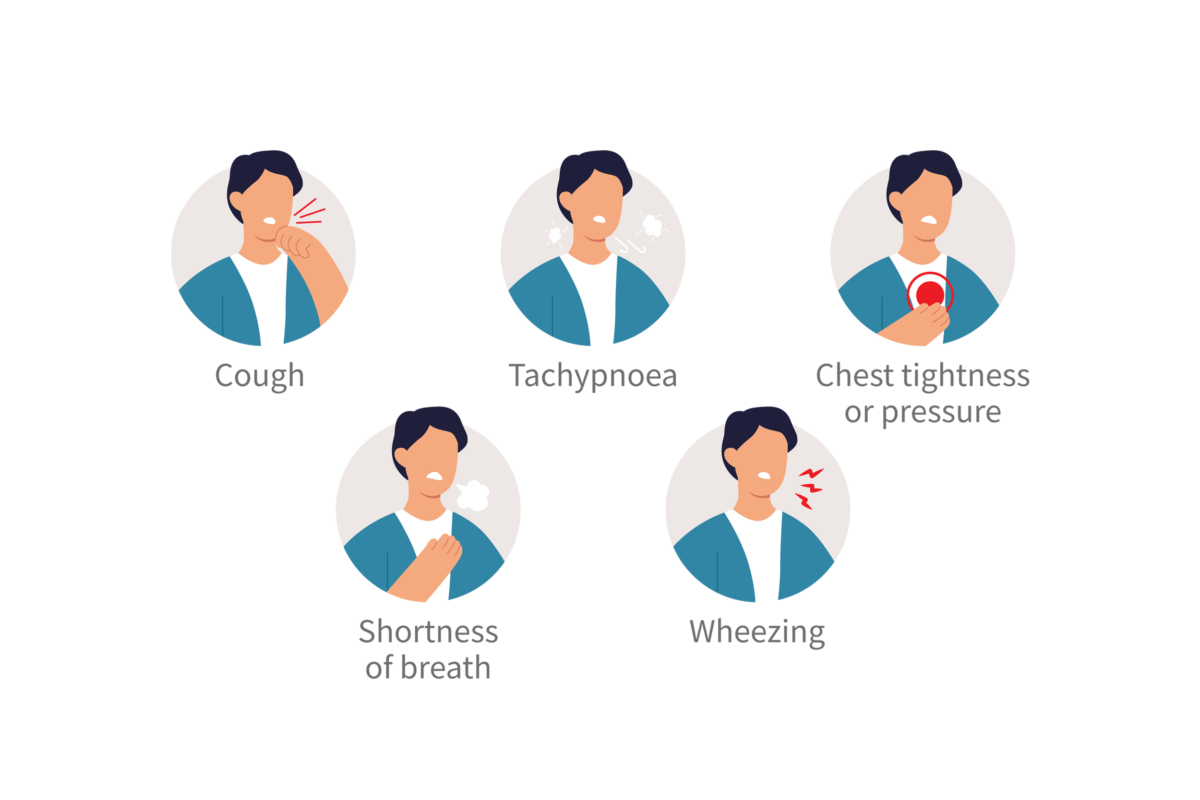Asthma
Asthma
Pathophysiology
Asthma is a chronic inflammatory disease triggered by factors that irritate the airways. Airways are narrowed as a result of inflammation and constriction of the muscles around the small airways. Symptoms may include intermittent or recurrent wheezing, difficulty breathing, chest tightness and coughing. If asthma is not well-controlled, it may affect sleep, concentration, and overall quality of life. It can also lead to work or school absenteeism. Severe cases of asthma often require hospitalisation and treatment and can even lead to death.

Triggers
1. Common aeroallergens that may cause allergic asthma include:
- House dust mites
- Cockroaches
- Tree / grass / weed pollen
- Mold
- Animal dander
2. Irritants:
- Tobacco smoke
- Air pollution (e.g., ozone or vehicle exhaust)
- Wood fires / charcoal grills
- Strong odors (e.g., perfumes, gasoline, paint)
- Change in weather
3. Medications: Certain medications can trigger asthma, such as aspirin, NSAIDs (non-steroidal anti-inflammatory drugs) and beta-blockers (blood pressure medication).
4. Exercise: Exercise can be a trigger for asthma. However, patients with asthma should not limit their physical activity! Patients with well-controlled asthma can lead to a normal exercise-filled life.
5. Stress / strong emotions
Other health conditions
Certain comorbid conditions can also be associated with asthma, such as:
- Atopic diseases, e.g., atopic dermatitis (eczema), allergic rhinitis, allergic conjunctivitis, chronic rhinosinusitis with nasal polyps
- Obstructive sleep apnea
- Chronic obstructive pulmonary disease
- Respiratory infections
- Obesity
- Gastroesophageal reflux disease
Symptoms
When patients experience an asthma attack, they may have the following symptoms:

Treatment
Although asthma cannot be cured, proper use of medications can offer disease control and symptomatic relief so patients can carry on with their daily lives. Asthma medication can be classified into 5 main categories:
- Quick-relief medication: Used only during an asthmatic attack.
- Controllers / maintenance medication: Used regularly for the control and prevention of asthma attacks. These usually include inhaled steroids (medicine that reduces the inflammation) and bronchodilators (medicine that helps relax the tight airways).
- Oral steroids: These are mainly used during an asthmatic attack. Long-term use can lead to detrimental side effects and health consequences.
- Allergen immunotherapy: If you have allergic asthma, immunotherapy (allergy sublingual therapy or allergy shots) under the guidance of your allergist may be helpful. Talk to your allergist to discuss whether this therapy is suitable for you.
- Biologics: This type of treatment targets certain proteins in specific types of asthma. They are usually reserved for patients with severe asthma that are not controlled well despite adequate use of inhaled medications.
It is important to discuss with your doctor a treatment plan that is tailored for you. Our goal is to achieve good control of your asthma which should allow you to live an active life without asthma symptoms.
Recovery
What can I do to control my asthma better?
1. Know your asthma triggers
- Knowing your asthma triggers is important in prevention of asthmatic attacks. Measures to reduce certain environmental aeroallergens, such as house dust mites, tree / grass / flower pollens, and animal dander can drastically improve your asthma control.
2. Regular exercise
3. Take your prescribed asthma medications
- It is important to discuss with your doctor a treatment plan that is tailored for you. Our goal is to achieve good control of your asthma and should allow you to live an active life without asthma symptoms. Side effects of medications should be reviewed at every visit. We aim to use the lowest possible dose of medications to achieve control.
- If you are experiencing side effects from the medication, you should inform your doctor.
- There are many different types of inhalers in the market. Knowing which inhalers best suit you is important and should be discussed with your doctor or pharmacist.
4. Develop an action plan for your asthma
You should be able to recognise symptoms of asthma and know what to do in case of an asthmatic episode or emergency.
Myths

